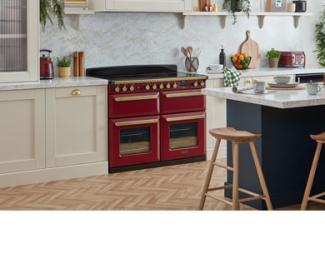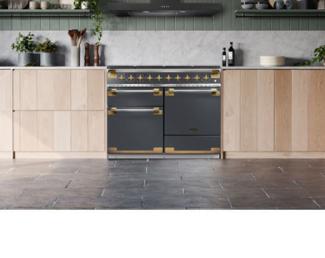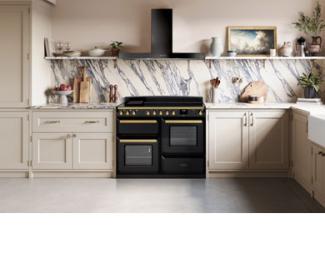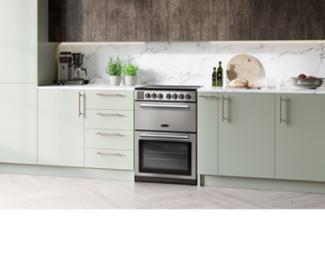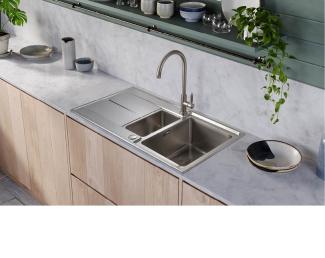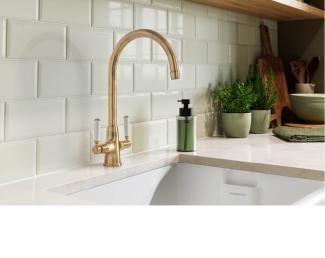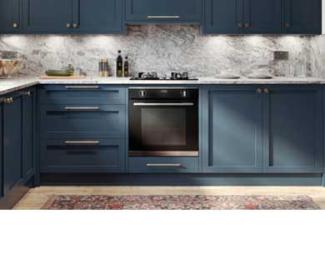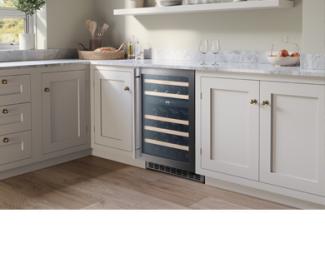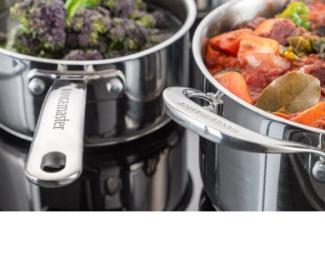In this comprehensive guide we'll explore the ins and outs of induction cooking, how induction cookers and this method of cooking differs from gas and electric options, their benefits and drawbacks, and even dispel some common myths. Let's dive right in.
In this guide, we’ll be covering:
- What is induction cooking?
- How is it different from electric and gas?
- How does induction cooking work?
- Benefits of induction cooking
- Features of induction cooking
- How efficient is induction cooking?
- Disadvantages of induction cooking
- Health and safety tips
- Cleaning and maintenance
- Cost of an induction cooker
- Myth buster
- FAQs

What is induction cooking?
Induction cooking is an innovative cooking method that uses electromagnetic energy to directly heat pots and pans, offering a faster and more energy-efficient alternative to traditional gas and electric cooktops. Cooking on an induction range cooker can offer unparalleled performance, energy efficiency and safety.
How is it different from electric and gas?
While gas and electric cooktops rely on external heat sources to warm pots and pans, induction cookers generate heat within the cookware itself, making for a more efficient and precise cooking experience.
How does induction cooking work?
Induction cooking works by using an electromagnetic field to generate heat within your induction cookware, providing precise temperature control and even heating. The induction hob cooker's surface remains relatively cool, as the heat is generated in the pan itself.

What are the benefits of induction cooking?
In the world of modern cooking, induction cooktops have emerged as a game-changer, and an increasingly popular choice among home cooks and professional chefs alike.
Energy efficiency
Induction cookers transfer energy directly to your cookware, making them significantly more efficient than gas or electric options, reducing energy consumption and lowering your utility bills.
Enhanced safety
With an induction range cooktop, there's no open flame or exposed heating element, significantly reducing the risk of burns or fires. Additionally, the cooking surface remains relatively cool, further enhancing safety.
Better controllability
Cooking on induction range cookers provides precise and instant temperature control, allowing for better results when preparing delicate or complex dishes.
Easy to clean
Since the cooktop surface stays relatively cool, food spills and splatters won't burn onto the surface, making it much easier to clean.
Environmentally friendly
With improved energy efficiency and no open flame, induction cookers are a more eco-friendly choice for your kitchen.
Heats faster
Induction cookers can heat cookware faster than traditional gas or electric cooktops, reducing cooking time and increasing convenience.

Features of induction cooking
Induction cookers are packed with innovative features that make them stand out from traditional gas and electric cookers. They not only simplify your cooking process, but provide greater versatility and control.
Low temperature settings
Induction cookers offer precise low-temperature settings for delicate cooking tasks, such as melting chocolate or simmering sauces.
Bridging zone
Some induction range cookers feature bridging zones that can be combined for larger cookware or more flexible cooking options.
Griddle
Take your cooking to the next level with an induction griddle which provides flexibility when cooking a variety of cuisines and healthy dishes.
Power boost
Power boost features on induction cookers enable rapid boiling or high-heat cooking, further shortening the cooking time.
Pan detection
Many induction cooktops include pan detection, which automatically turns off the cooktop if no pan is present or if the wrong type of pan is used.
Boil dry protection
Boil dry protection prevents damage to your cookware by shutting off the induction hob if it detects that a pan has boiled dry.
How efficient is induction cooking?
Induction cooking is significantly more energy-efficient than gas and electric cooktops, typically using about 84% of the energy generated compared to around 70% for electric and 40% for gas.
Are there any disadvantages of induction cooking?
While induction cooking has numerous benefits and cutting-edge features, you should be aware of its potential drawbacks. Understanding these will help you make an informed decision on whether an induction cooker is the right fit for your kitchen and cooking needs.
Price
Induction cookers can be more expensive than traditional gas or electric cookers, but the long-term energy savings can offset the initial cost.
Adjusting ways of cooking
As induction cooking heats faster and offers precise temperature control, there may be a simple learning curve to adjust your cooking habits.
Scratches
Induction cooktops can be susceptible to scratches if care isn't taken when using or cleaning the surface. However, this can be prevented by using appropriate cookware and cleaners and following proper cleaning procedures.
Induction cookware
Induction cooking requires the use of magnetic cookware, such as cast iron or stainless steel with a magnetic base. Not all cookware is compatible, so check the manufacturer's recommendations or test with a magnet to ensure compatibility.
Health and safety tips
- Always use compatible cookware on your induction cooktop.
- Avoid using damaged or warped pans, as they may not heat evenly.
- Keep the cooktop surface clean and free of debris.
- Don't leave empty cookware on a heated induction hob.
Cleaning and maintenance
Clean the induction cooktop after each use with a soft cloth and mild detergent. Avoid using abrasive cleaners or scrubbing pads, which can scratch the surface. For stubborn spills, use an induction-specific cleaner and follow the manufacturer's instructions.
Cost of an induction cooker
The price of an induction cooker varies depending on brand, features and size. While they can be more expensive initially, the long-term energy savings and performance benefits make them a worthwhile investment.
Myth buster
As induction cooking gains popularity, it is important to address the misconceptions that often surround this innovative technology. Some myths can lead to unfounded concerns, such as the following.
Radiation
While induction cookers use electromagnetic fields, they do not emit harmful radiation. The radiation levels emitted by induction cooktops are well below established safety standards.
Special wiring
Most induction cookers do not require special wiring and can be installed in homes with standard electrical systems. However, it's essential to consult with an electrician or the manufacturer for specific installation requirements.
FAQs
How much energy does induction cooking use?
Induction cooking is highly energy-efficient, typically using about 84% of the energy generated. The exact energy consumption will depend on your specific induction cooker model, cookware and cooking habits.
How do I know if my cookware is suitable for induction cookers?
To be compatible with induction cookers, cookware must be magnetic. Suitable materials include cast iron and stainless steel with a magnetic base.
Pan Performance Check Method:
- Use a 1.85 Kw zone (centre zone on Rangemaster models, refer to manual for ratings of each zone).
- Fill an unlidded pan with 1/2 litre of room temperature water (the diameter of pan should not be greater than the outer circle of the zone).
- Operate the zone at power level 9.
- The water should boil within 3½ minutes. Boiling times outside this duration would suggest that the pan construction is not ideal to provide best performance and can result in premature component failure.
Which brand of induction range cookers should I choose?
Of course, induction cookers from other manufacturers are available, but when it comes to choosing a range cooker, we believe Rangemaster stands out. With a combination of cutting-edge technology and stylish designs, our induction cookers offer a range of features, finishes and sizes to fit any kitchen's style and cooking needs.

From easy-to-use controls to automatic shut-off and child locks, the Rangemaster induction range cookers offer the ultimate cooking experience, making them the perfect choice of hob for anyone seeking high-performance, style and functionality.
Which size of induction range cookers should I choose?
The size of the induction range cooker you choose will depend on your kitchen space, cooking needs and personal preferences. Induction range cookers are available in various sizes, typically ranging from 90cm to 110cm. Measure your available space and consider your cooking habits when selecting a size.
What colours do you do?
Our induction range cookers come in a variety of attractive colour options, from classic black, white and stainless steel to an array of signature Rangemaster colours, such as cherry red, racing green, china blue and royal pearl. With our extensive range of colours, you can find the perfect shade to complement the design and style of your kitchen.
What are the best utensils to use for induction cooking?
For induction cooking, use utensils made from materials that won't scratch the cooktop surface, such as silicone, nylon or wood. Avoid using metal utensils, which may cause scratches or damage the induction cooktop surface.
Is a range cooker with induction hobs quicker and easier to clean?
Yes, range cookers with induction hobs are quicker and easier to clean compared to traditional cooktops. Since the cooktop surface stays relatively cool, food spills and splatters won't burn onto the surface, making it much easier to wipe clean with a soft cloth and mild detergent.
Are there any other types of range cookers available?
Yes, in addition to induction, there are other types of range cookers available.
- Dual-fuel range cookers combine the advantages of both gas and electric cooking. They feature responsive gas cooktops for precise heat control and powerful electric ovens for even cooking performance.
- Ceramic range cookers use a glass-ceramic surface with embedded heating elements, providing a smooth, easy-to-clean cooktop with radiant heat. They offer a sleek, modern design and the versatility of radiant heat cooking.
- Gas range cookers use natural gas or propane as fuel, providing instant heat and precise temperature control. While less energy-efficient than induction cookers, gas range cookers offer the traditional look and feel that many home cooks appreciate.
What type of metal is used for induction cooking?
Induction cooking requires cookware made from magnetic materials, such as cast iron or stainless steel with a magnetic base.
Can you slow cook on an induction hob?
Yes, you can slow cook on an induction hob by using the low-temperature settings available on most induction cookers. These settings allow you to maintain a consistent, low heat for extended periods, making them ideal for slow cooking.
Can you cook on a range induction cooktop with a pacemaker?
In most cases, it’s safe to use a range induction cooktop with a pacemaker, as the electromagnetic fields generated are well below established safety standards. However, it is recommended that you consult your doctor or the pacemaker manufacturer to confirm compatibility.
Can I use an induction cooker if I have an insulin pump?
Yes, it is safe to use an induction cooker if you have an insulin pump. The magnetic field generated by an induction cooker should not affect the function of the insulin pump. However, as with any electrical device, it's important to follow manufacturer guidelines and safety instructions to ensure proper use.
Conclusion
Induction cooking is an energy-efficient, safe and precise cooking method that offers numerous benefits over traditional gas and electric cooktops. With a range of innovative features and long-term savings on energy bills, it's an investment worth considering for your kitchen. So, take the leap and explore the world of induction cooking. You won't be disappointed!


